Pedro Pascal Says ‘I’m a Little Drunk’ During Teary-Eyed SAG Awards Acceptance Speech: ‘I Thought
Pedro Pascal Says ‘I’m a Little Drunk’ During Teary-Eyed SAG Awards Acceptance Speech: ‘I Thought I Could Get Drunk! I’m Making a Fool of Myself’
 Getty Images
Getty Images
Pedro Pascal won the SAG Award for male actor in a drama series thanks to his role on HBO’s “The Last of Us,” but he wasn’t exactly sober when he took the stage to give his acceptance speech. The actor admitted he thought he could get drunk, likely because he didn’t think he would win the SAG Award after “Succession’s” Kieran Culkin won the same category at the Golden Globes and Emmy Awards earlier this year.
“This is wrong for so many reasons,” Pascal told the audience. “I’m a little drunk. I thought I could get drunk. I’m making a fool of myself but thank you so much for this! I’ve been in the union since 1999 so this is an incredible fucking honor. To the nominees, all of you, I can’t remember any of your names right now.”
Pascal started to fight back tears as he thanked his family, only to immediately bring his drunken acceptance speech to an end by saying: “I’m going to have a panic attack and I’m going to leave.”
This year’s other SAG Award nominees for male actor in a drama series were Culkin, Brian Cox (“Succession”), Billy Crudup (“The Morning Show”) and Matthew Macfadyen (“Succession”
Whether he’s won or not, Pascal has been creating one viral awards show moment after the next this season. He memorably joked at the 2023 Emmy Awards that a recent shoulder injury was because “Keiran Culkan beat the shit out of me.” Pascal attended the event in an arm sling.
Culkin started a fake feud with Pascal at the Golden Globes when he won the prize for best actor in a TV drama and said during his acceptance speech: “I was nominated for a Golden Globe like 20 years ago, and when that moment passed, I still remember thinking, I’m never going to be back in this room again. But thanks to ‘Succession,’ I’ve been in here a couple times. Suck it, Pedro!”
Pascal said backstage after his SAG Award win that he was going to “make out” with Culkin as his revenge. “He is the greatest,” Pascal added. The actor also said he did not remember what he said during his acceptance speech.
Pascal will return to “The Last of Us” for the upcoming Season 2, which goes into production this year. The show is not likely to return to HBO until 2025.
General Synod February 2024 - Presidential Address

Geoff Crawford/Church of England
Read Archbishop Justin's Presidential Address in full:
In September 2023, Antonio Guterres, Secretary General the United Nations declared the world is coming off its hinges. How should we the followers of Jesus Christ respond?
Walter Brueggemann commented on the Psalms that the Psalms have the abrasive effect of dismantling the old systems that hide the well off from the dangerous realities of life. The ordinal never uses the word suffering.
The Psalms speak constantly of suffering as a dangerous theological reality, and we are curiously blind to it. Church of England Bishops at consecration commit to all sorts of things, some probable, some improbable, but they don't commit to suffer. By contrast, the Chaldean Church tells its Bishops that they will be the first to suffer. Cyprian writes endlessly of suffering, especially referring to the confessors and martyrs, ascribing to them influence in advising or rebuking the Bishop. And he had a high view of Bishops.
One of the great treasures of the communities of St. Anselm at Lambeth, is that altogether we say the Psalms on the prayer book monthly cycle. So every month we're reminded of how many enemies we have and what we want it to happen to them. Psalm 56 talks about our internal life in suffering when we face enemies, and enemies are mentioned 71 times in the Psalms. And in Psalm 56, David is in a place of immense trouble, it refers to him being at Gath, which was in Philistia, very close to where Gaza is. Suffering as part of God's people's experience comes from the normal challenges of life. From those who will be wrongly perceive as enemies externally, and also from those we wrongly perceive as enemies internally.
And to add to what the Secretary General of the United Nations said, as Lord Cameron said recently, when he looks around at the world today as Foreign Secretary, all the lights are flashing red. We live in a world of suffering. And unlike in the past, it is a world where we are aware of the suffering.
In Europe, the Ukrainian Russian war is frozen. We will discuss it later in this group of sessions. And the suffering of the people in Ukraine has increased, not least because it has been replaced as the principal concern by the havoc and horror of the Levant and all that is going on in that area. The House of Bishops commented on this last Friday week.
But there is much more.
Let us briefly turn our minds to the forgotten horrors, those whose very existence is scarcely mentioned. In Myanmar civil war has raged for several years, and millions have been driven from their homes. In the DRC, more than 5 million have now died in war or because of war since 1995. In Sudan, according to the UN High Commissioner for Refugees, whom I saw on Wednesday, the intolerable suffering of the people would constitute the worst refugee crisis on Earth, were it not for the crises in all the surrounding countries.
Between them, they create one great region of shifting internally displaced people and refugees, harried, hunted, women violated, children traumatised, driven from place to place. And the world does not watch. The world turns its head away.
And in saying that, in this world, we have also forgotten so many other areas. Displacement in northeast India, in the South Pacific, in the Philippines. We forget the tensions in Korea with a nuclear armed power. In Pakistan again, nuclear armed, in Nigeria, in massacres in Mozambique, where Anglicans work in an interfaith manner, alongside the UN mediation Support Unit to find ways of undermining the popular appeal of ISIS. And in the Philippines, where low-level insurgency still happens in various places.
And I've not even spoken as yet of the vast numbers of people on the southern borders of the United States, or of the 75% of refugees who stay in the usually exceptionally poor countries on the immediate borders of their own. Those countries of refuge themselves staggeringly poor, struggling, bearing the lion's share of people movement.
Pope Francis a few months ago described what is already happening as a third world war. Right or wrong, he is describing a state of global uncertainty and great change. Like all such periods, minorities are blamed for uncertainties, conspiracies are assumed where there is uncontrollability and leaders are criticised where the future is hard to see. Amidst it all, there is intense, terrible, indescribable personal suffering, and neither is it confined to abroad. Communities in this country, as so many people in this chamber know well, suffer from poverty and lack of resource, broken families, mental illness, abuse. It is the nature of life to suffer, not worse than ever before, but a reality of suffering.
Suffering is normal. The Psalms say so, the news tell us so, experience reveals itself. Yet in our comfortable country, for many, not for all, our expectations of suffering are low. Job's comments in the language of the King James Version, man is born to suffering as the sparks fly upwards, is replaced by an expectation that in every situation, there is some way to put it right. And a febrile angst becomes normal.
It is very tempting to say that in such a time as this, we should put aside the issues within the church, but that would be a very serious mistake. In 1939, George Bell wrote an article on the behaviour of the church in a time of war. 'What should the church do in a time of war?' it was entitled. His simple conclusion was that the right strategy, a word he did not use, is to be even more the church. We must be even more the church with all our challenges and difficulties and as we work through them. What that looks like is seen in many cases, but I'm going to take Psalm 56, if you have access to that, do look it up. Remembering that Psalm 56 is the song of someone surrounded by danger and without human hope of rescue.
We are to recognise reality and continue to seek to live in holy obedience. I am convinced that is the aim of all the different groups in the differing discussions that we have, already had in many Synods, and will have in this. The church suffers and has enemies, people suffer and have enemies. Enemies are part of life.
But behind enmity isn't mere human difference. Other malign forces, more malign, are at work. As Paul tells us in Ephesians six, our struggle isn't against flesh and blood, we need to remember that, but against the principalities and powers. Suffering and enmity have prolonged and profound impacts on each one of us.
We have to start by recognising those impacts. The fear and suffering that come from division, make us look at other people as our enemies and we have to resist that illusion in faithful and honest community. Causes of fear, which leads to a sense of enmity are well disguised as uncertainty, unpredictability and uncontrollability of life and like barnacles on the hull of a ship, they attach themselves to make us see other people as our enemies, and that is the devil's work.
Enemies make us afraid. Fear makes us suffer. Someone the Archbishop of York and I met recently from outside the church said that while they were working on a project for the church, they grew to fear opening their emails, because of the bitterness and abuse they were subject to. At Lambeth, the brilliant member of staff who deals with the endless correspondence that comes in, is worn down by the expressions of hatred, normally coming from within the church.
In both the Old Testament and New Testament we're encouraged not to fear, but the psalmist with honesty says 'when I am afraid'. Fear corrodes, it causes neurological degeneration of hormones and chemicals that make us ill.
Second, suffering and enemies are relentless. The Psalm says, all day long enemies oppress me. We all have people who never seem to give up, situations that are never resolved, anxieties that torment. If they can't get us one way, they seem to have time to try again, endlessly. The principalities and powers work intelligently through our minds and emotions, twisting what is said and done, to find a reason to accuse from within and without. They accuse us ceaselessly and without mercy. Spurgeon, commenting on this Psalm said, a wolf can always find in a lambs discourse, a reason to eat him.
We get blamed for provoking the accusations, not just the justifiable criticism, that's fine, but the accusations that are pulled on us. That's not my view alone, but it's a view of two people experienced in dispute and conflict, who have observed the General Synod. Each group, or person, or supporter of a cause, can too easily be made to feel guilty for being so tasty, so provocative, when they are a lamb.
We are human and that is why we fail. But we are all also mysteriously but assuredly, being transformed into the likeness of Christ, by the work of the Holy Spirit of God. And so we must cooperate with that, we should not seek to use ambiguity of meaning by others to our advantage. See verses five and six.
But we need to assume the best and the most generous, rather than the worst. Suffering and enemies are faced best in communities that trust across divides, rather than in self protecting, and reinforcing huddles, because the very act of trusting across the divides builds our resilience and our ability to see the best in others. It is a trial though, to do that. And we as God's people, as the Church of England, must deal well with the issues that faces us internally, if we are able to minister effectively externally to our nation and world.
At the end of April, we will have a meeting of primates of the Anglican Communion in Rome. There we will look at what the communion could do to remain in a variable geometry of unity, but also an unvarying commitment of love in Christ. Those two expressions vary in geometry of unity and unvarying commitment of love in Christ offer us all a way forward in holy obedience to God.
They are not perfect states, but they are steps along the journey. I wonder if we are able to imagine the same in the Church of England. Honesty, transparency, love in agreement, persistence in good change, all point unbelievers to Christ, whose spirit calls us to shine as light.
And third, enemies and suffering drive us to God if we are wise in honest protest, passionate lament and proper assurance. Verse eight of the Psalm, tears are stored up. But the Psalmist asks God, you've stored up my tears in a bottle but do you ever check on them? Do ever make sure that you remember them?
Together, we must pray truthfully and with lament and protest, which like the word suffering are rare in our liturgies. God knows. We must not leave God out of our discussions, neither instrumentalise that false view of God that puts God in our pocket to do what we want. So God sees our suffering, our enemies, our fears, and nothing, not even our fears, are lost.
Fourth, God is our refuge. God is our refuge, not our politics and our organisations. They are realities of any structured life, of any institution, they're not evils, but God is our refuge, they never will be. Verses one, two, three, four and nine.
The Psalmist, amidst this desperation, gives thanks. We are never beyond the strength and the recall of God. David escaped from Gath, not because of himself, but because of God's faithfulness. The Lord does not abandon His church today, however it wanders, for he searches and finds it and carries it back.
The Psalmist of Psalm 56 is also the Psalmist of the shepherd Psalm, 23. We can fail but God cannot. Amidst the turmoil of the world, the fears of even greater conflicts, perhaps overwhelming continents, the hard choices we have to make, God is always at work among us today and every day. There is no fear, I have no fear, we must not fear for the future of the church. Suffering is normal, but God is faithful and we are called to be His faithful people.
And today the church remembers Polycarp as he was martyred in 155 he had the option of denying his faith. ‘Eighty and six years I have served him and he has done me no wrong’. How then can I blaspheme my King and Saviour? I bless You, Father, for judging me worthy of this hour, so that in the company of the martyrs I may share the cup of Christ.
Brueggemann’s words about reality, call us back to the need to be living as people certainly who are different from the world, but live genuinely in the world. Not in self referential groups that reinterpret the world for their own benefit, and that takes depth of listening, and above all, trust in the good purposes of God for God's Church, shown in history and to be completed in time.
God is greater than our fears, than our enemies and in our failures. God is unbreakably faithful to covenant and promise. When that is our comfort and peace, then in this world, at this time, off its hinges, we can in all our troubles, be truly the church we should be, truly God's Church in God's world.
Ukraine-Russia war latest: Navalny's body released after mother refused ultimatum; Ukrainian air force positions 'wiped out in attack'
Alexei Navalny's body has been handed over to his mother after an ultimatum. Meanwhile, Russia's invasion of Ukraine has now entered its third year. Western leaders travelled to Kyiv this morning to show solidarity, while the UK has pledged to send £245m of munitions.
Saturday 24 February 2024 23:30, UK
Spreaker
This content is provided by Spreaker, which may be using cookies and other technologies. To show you this content, we need your permission to use cookies. You can use the buttons below to amend your preferences to enable Spreaker cookies or to allow those cookies just once. You can change your settings at any time via the Privacy Options.
Enab
Eyewitness: Most Ukrainians are hopeful their country could still be victorious - but many are angry and frustrated
By John Sparks, international correspondent
In Kyiv, it seems a new tradition has been established, a tradition and a solemn occasion.
The second anniversary of the invasion of Ukraine was marked by people in many ways, but Volodymyr Zelenskyy commemorated the day in public with four Western leaders at his side.
The prime ministers of Canada, Italy and Belgium, plus the president of the European Commission, laid flowers at the Wall of Remembrance, as a simple drum was played in the background.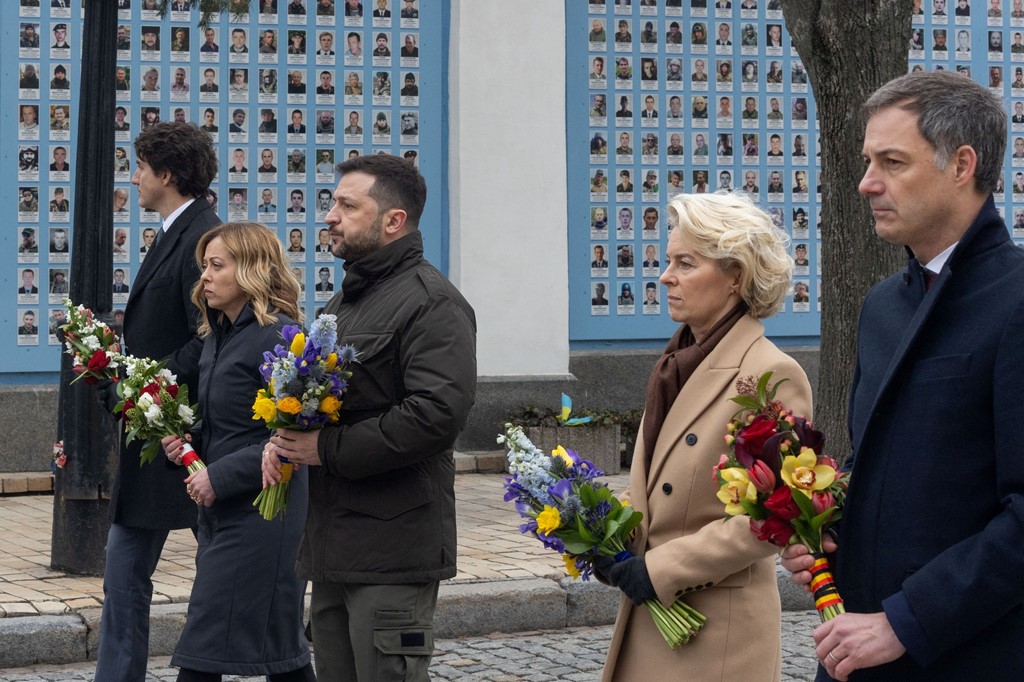 Reuters
Reuters
The memorial, which adorns the wall surrounding the monastery of St Mykhailivsky, was created in 2014 and has been updated over the past decade to honour victims of Ukraine's wars against Russia.
Yet it was not easy for members of the media to view the event, as the various entourages and armoured convoys of each leader were inserted into St Mykhailivsky Square.
The message was clear enough, however - one of solidarity and enduring western support.
Just 200 metres away, at St Sophia Square, the anniversary was commemorated differently.
We found hundreds of people expressing their rage over the continuing detention of some 900 members of Ukraine's Azov Battalion.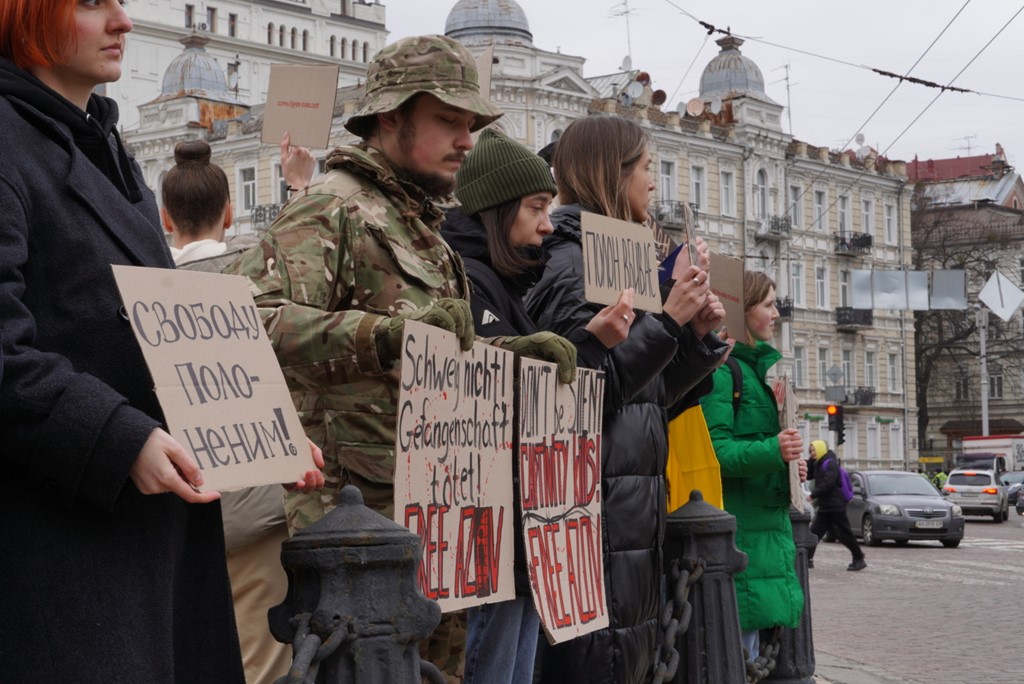 The soldiers, who were captured by the Russians during the defence of the city of Mariupol, have not been released and many are frustrated with the progress of slow-moving prisoner exchanges.
The soldiers, who were captured by the Russians during the defence of the city of Mariupol, have not been released and many are frustrated with the progress of slow-moving prisoner exchanges.
Kyiv resident Maria Bzhestovska told us: "Our defenders are in captivity, so we have to be their voice. We're tired, but those who are currently at war are even more tired.
"We are tired here, but we can go to a warm bed and rest, while they sit in the trenches, sick, tired, wounded."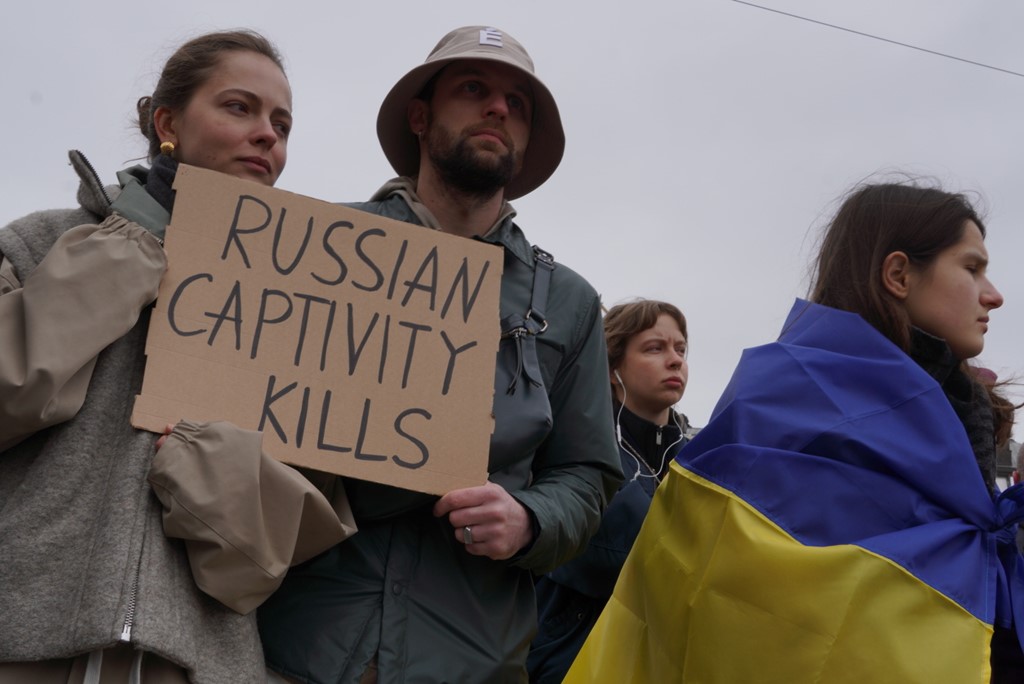 There are some in this country who refuse to fight, either hiding at home or escaping the Ukrainian draft by fleeing to countries like Moldova and Romania. Some 20,000 men, it is thought, have broken the law by leaving the country.
There are some in this country who refuse to fight, either hiding at home or escaping the Ukrainian draft by fleeing to countries like Moldova and Romania. Some 20,000 men, it is thought, have broken the law by leaving the country.
A veteran of the battle for Mariupol, called Denis, expressed his exasperation.
"Those who don't want to fight, those who can't even join a protest rally, I have nothing to say to these people. We live in one country, under one sky, and some people sacrifice the most precious things, while others hide," he said.
Most people here remain hopeful - but everyone has been scarred by this war.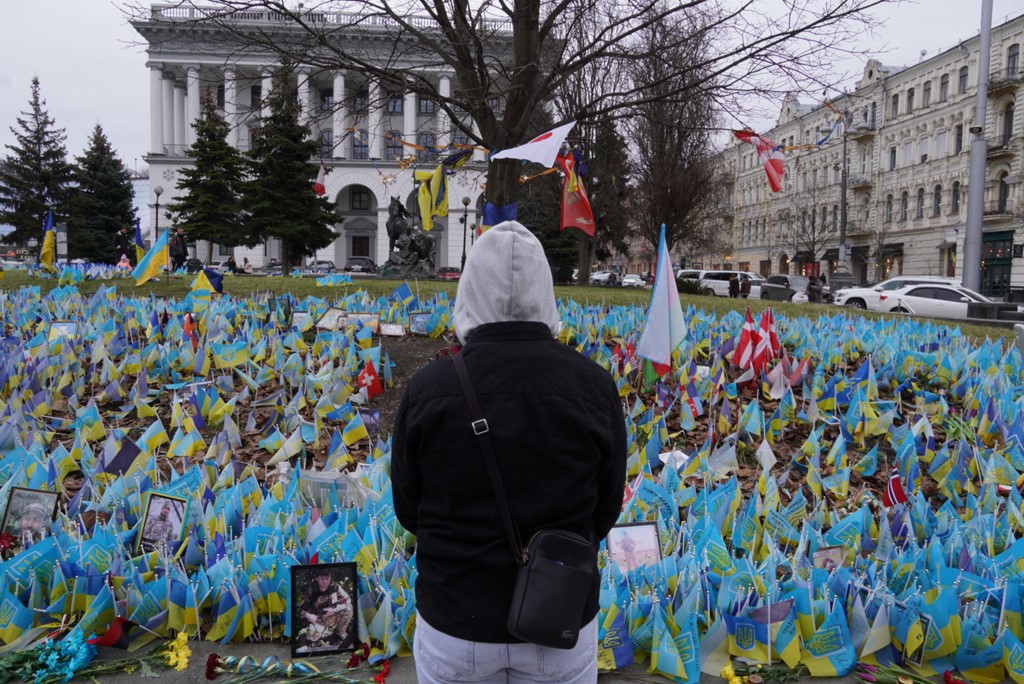 We met a young woman called Anna Bondarenko in Maidan Square, where a forest of small Ukrainian flags have now been planted in honour of soldiers who have lost their lives.
We met a young woman called Anna Bondarenko in Maidan Square, where a forest of small Ukrainian flags have now been planted in honour of soldiers who have lost their lives.
Ms Bondarenko told us that one flag represents her father – a businessman turned sniper who was killed by an enemy shell.
Their home, in the region of Kherson, is now occupied by the Russians. She told us that her life is something that has to be faced alone.
"I don't have any family, I am an orphan now…. what can be worse than that? Well nothing."
In pictures: Demonstrations held around the world today
Thousands of people around the world have held demonstrations today, calling for the war to come to an end.
Solidarity marches with Ukraine were held across Europe, including in London, Finland and Hungary.
Many held signs referring to Vladimir Putin as a "terrorist" and urging the West to send more support to Kyiv.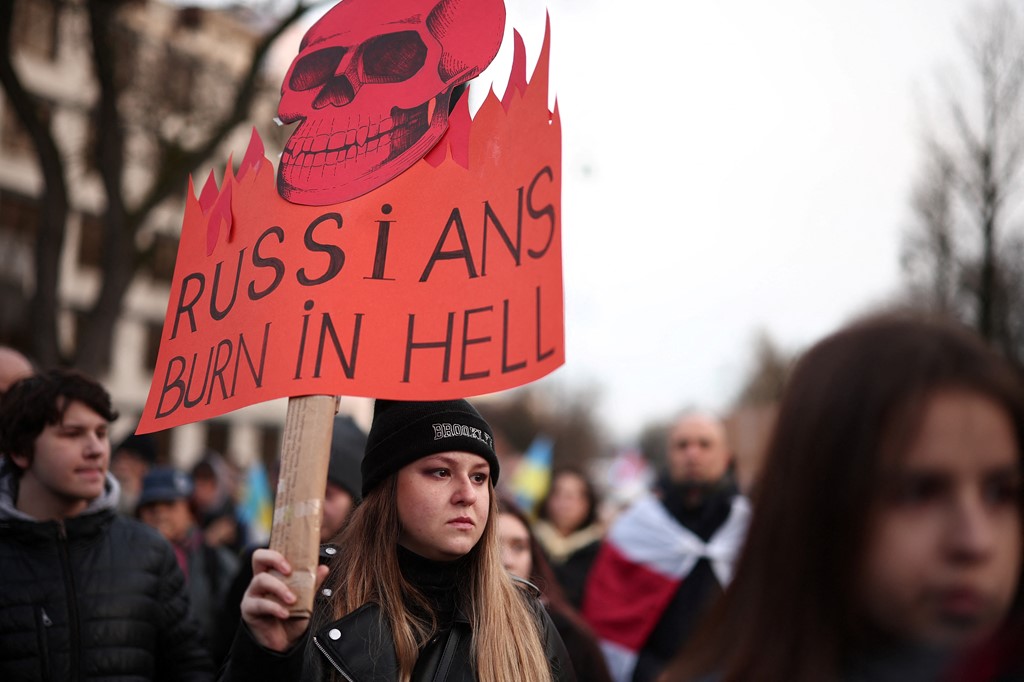 A demonstration in Warsaw, Poland
A demonstration in Warsaw, Poland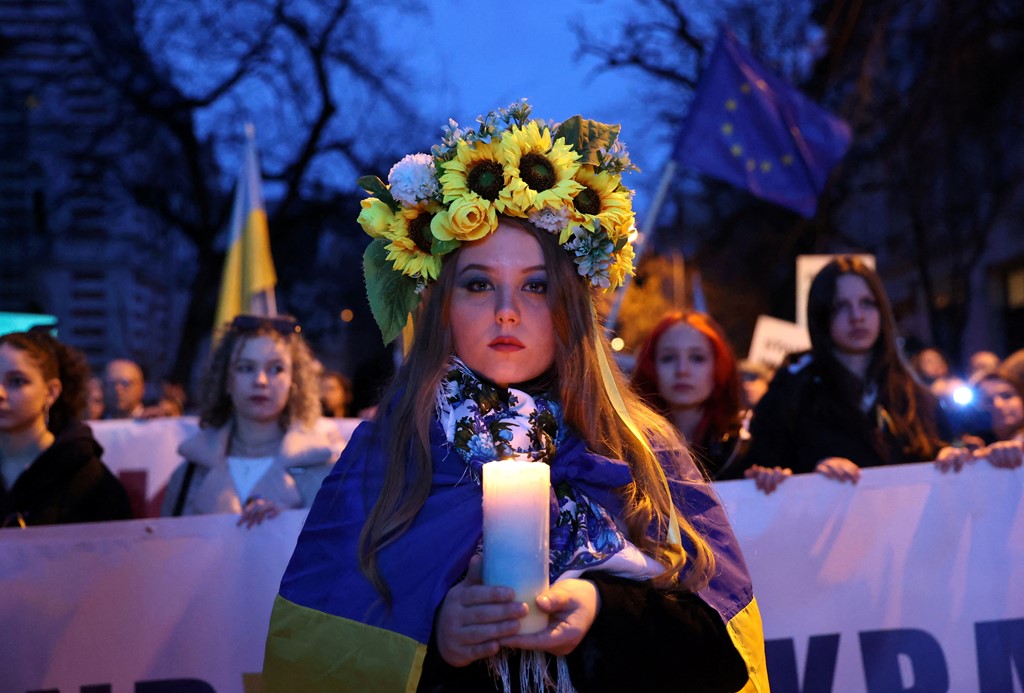 Hundreds held a peaceful protest in Budapest, Hungary
Hundreds held a peaceful protest in Budapest, Hungary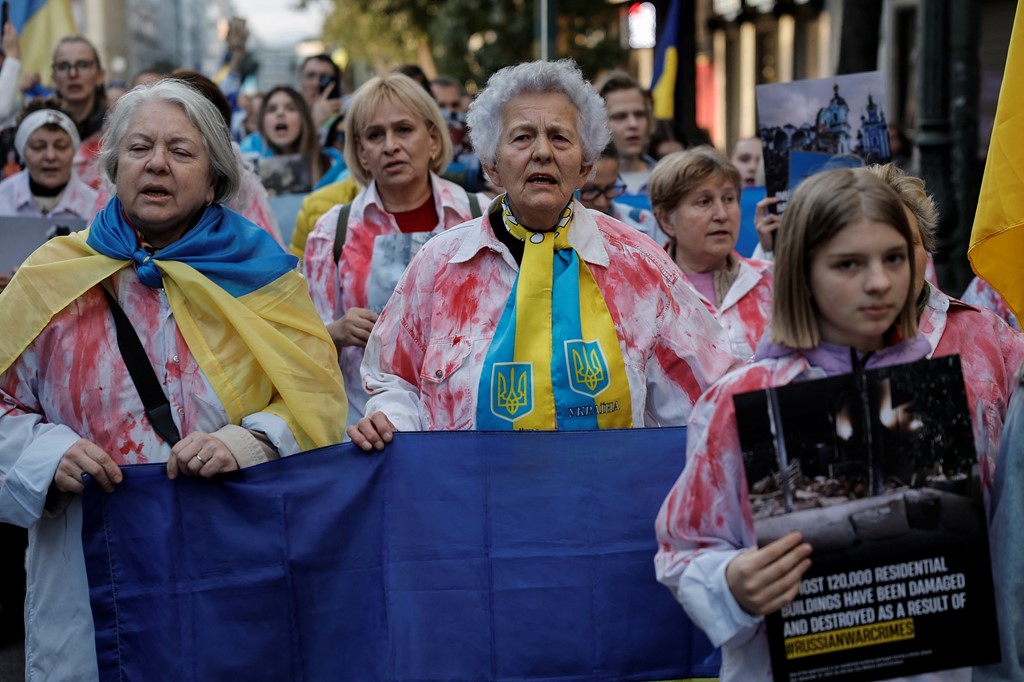 People wore shirts stained with fake blood in Athens, Greece
People wore shirts stained with fake blood in Athens, Greece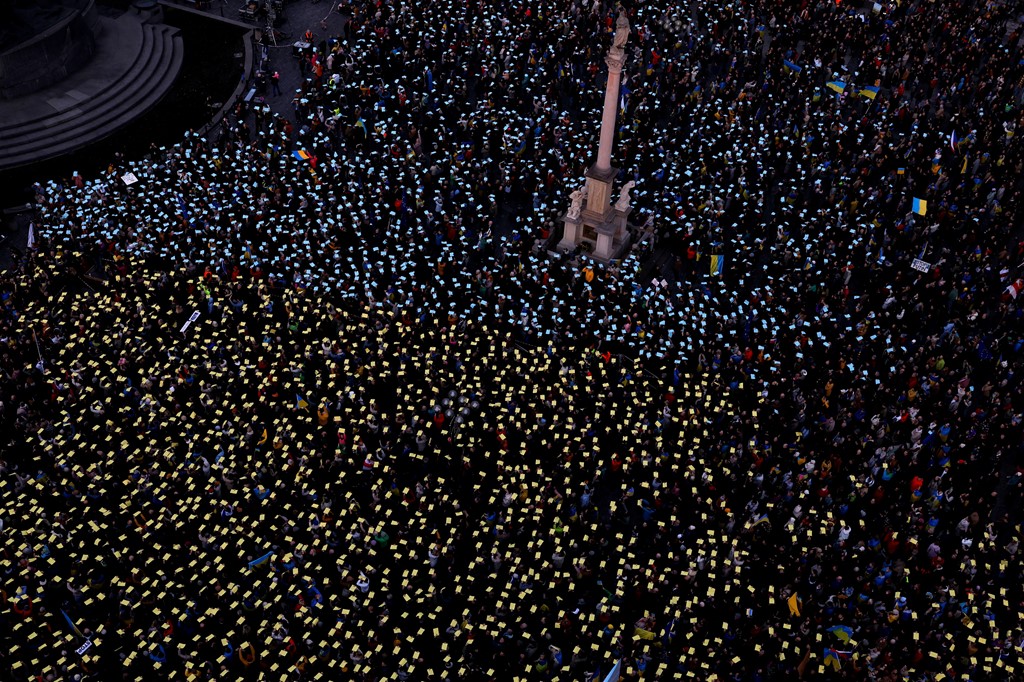 Hundreds of people held up the colours of the Ukrainian flag in the Old Town Square in Prague
Hundreds of people held up the colours of the Ukrainian flag in the Old Town Square in Prague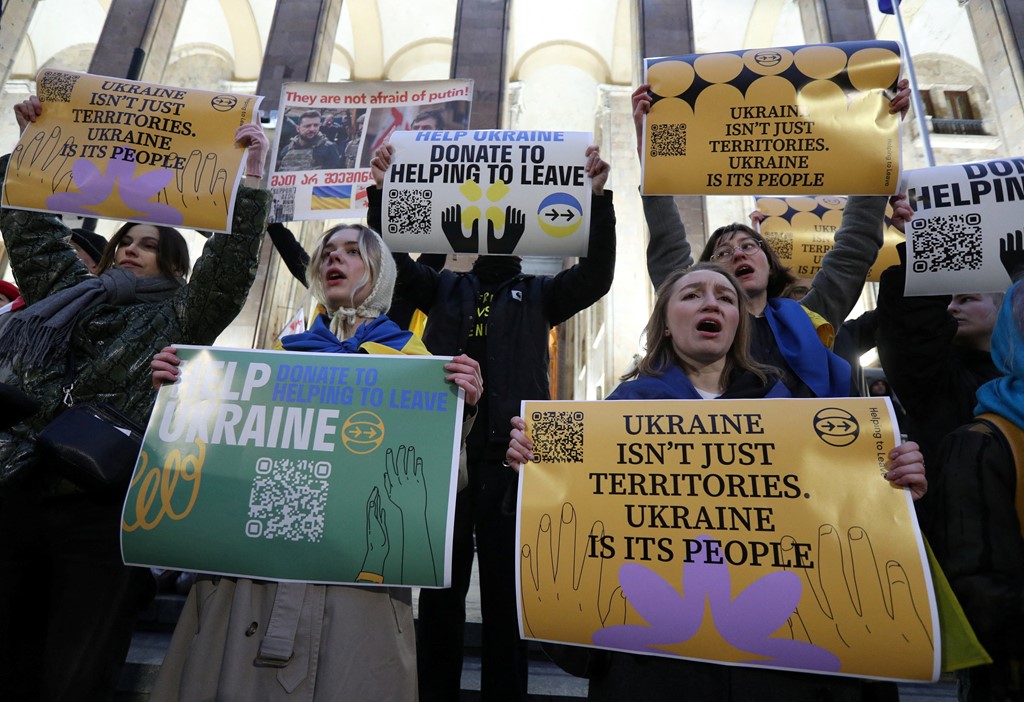 People in Tbilisi, Georgia, urged others to donate to Ukraine's war effort
People in Tbilisi, Georgia, urged others to donate to Ukraine's war effort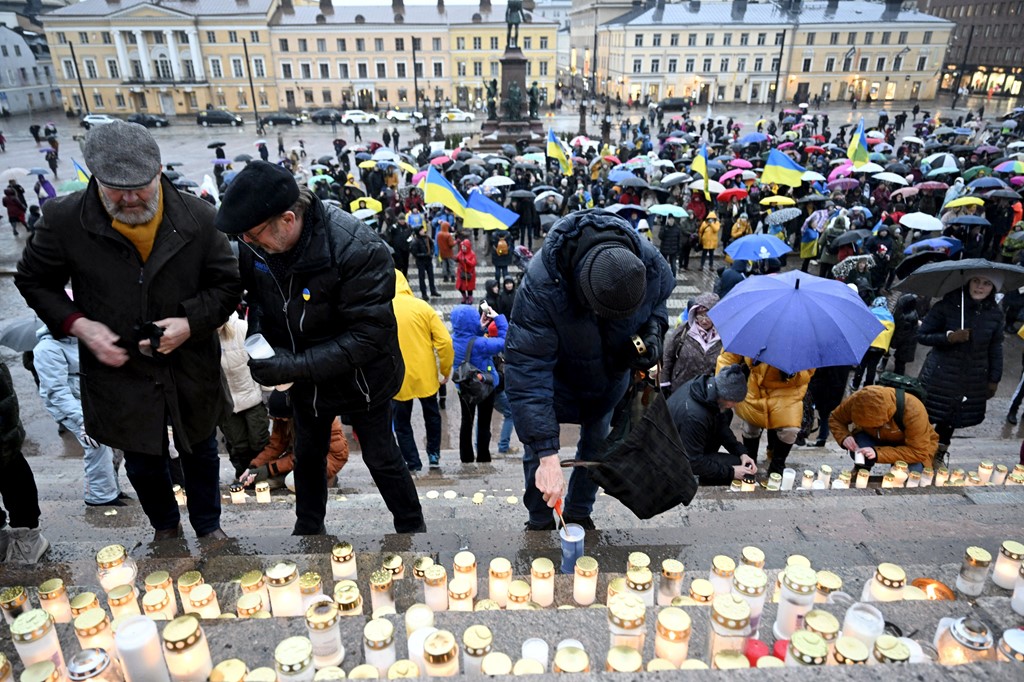 Protesters lit candles in Helsinki, Finland
Protesters lit candles in Helsinki, Finland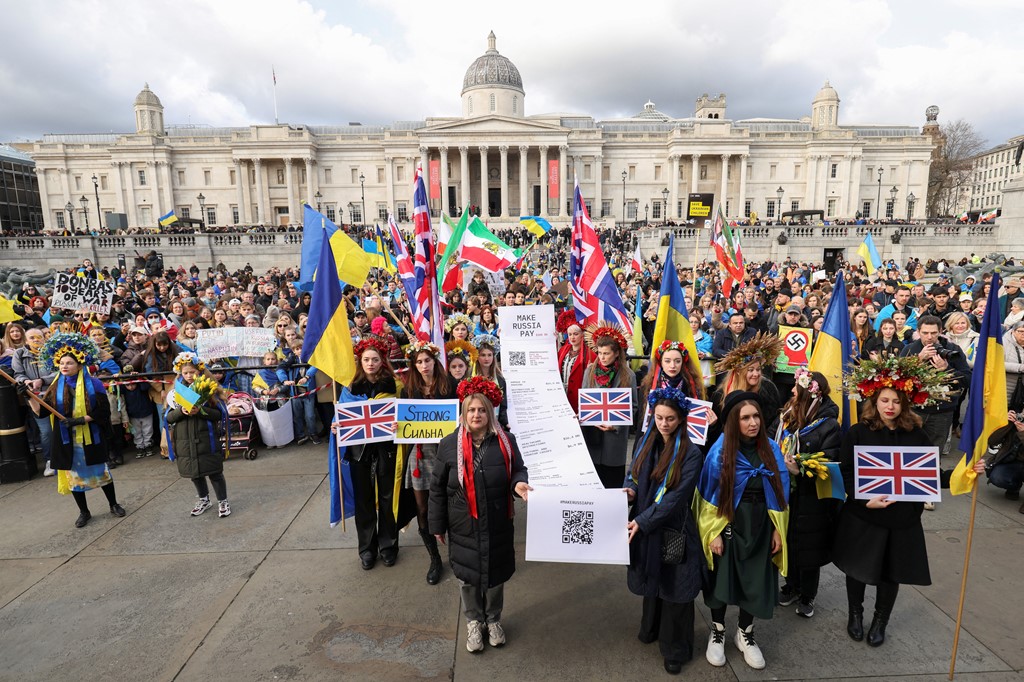 Demonstrators march through London
Demonstrators march through London
More than 30 celebrities send messages of support for Ukraine
More than 30 celebrities have appeared in a video sending messages of support for Ukraine.
Actors Robert De Niro, Mark Hamill, Emma Thompson and Hilary Swank appeared alongside the likes of Stephen Fry, U2's Bono and Bring Me The Horizon's frontman Oli Sykes in the nearly three-minute video.
"You are not only standing up for yourselves and your beautiful country, you are standing up for democracy and freedom for the world. Because if the war criminal Putin is successful in his illegal and immoral invasion of Ukraine, no country will be safe," De Niro said.
The video was created by UNITED24 - a platform created by Volodymyr Zelenskyy to collect donations in support of Ukraine's war effort.
Boris Johnson 'more confident than ever' that Ukraine will win
Earlier this evening we told you Boris Johnson had visited Volodymyr Zelenskyy in Ukraine on the second anniversary of the war.
The UK's former prime minister has now put out this tweet about his trip, saying he is "more confident than ever" that Ukraine will win the war.
X
This content is provided by X, which may be using cookies and other technologies. To show
Watch: Russian police check IDs of Navalny mourners
People across Russia have honoured Alexei Navalny's memory by gathering at Orthodox churches, leaving flowers at public monuments or holding one-person protests.
Outside Moscow's Christ the Saviour Cathedral today, several mourners were stopped by police for an ID check.
Videos published by independent Russian news outlet SOTAvision also showed Russian police stationed nearby.
As of this afternoon, at least 27 had been detained in nine Russian cities for showing support for Mr Navalny, according to the OVD-Info rights group, which tracks political arrests.
They included Sergei Karabatov, 64, who laid flowers at a Moscow monument to victims of political repression, along with a handwritten note saying: "Don't think this is the end."
Also arrested was Aida Nuriyevawho stood in a street with a sign saying: "Putin is Navalny's murderer."
Two people killed and seven injured in 'enemy strike'
Two people have died and seven others have been injured in a strike in Dnipro, Ukraine's internal affairs ministry has said.
A high rise building was also destroyed in the attack, it added.
"A man and a woman died as a result of an enemy strike. The emergency workers got the bodies of people from under the rubble," it added.
Glass-covered monument unveiled in symbolic city to mark anniversary
Religious figures, soldiers and Ukrainian officials have unveiled the "Cross of Heroes" memorial in the central city of Vyshhorod today.
The memorial was built to mark the second year of Russia's full-scale invasion of Ukraine.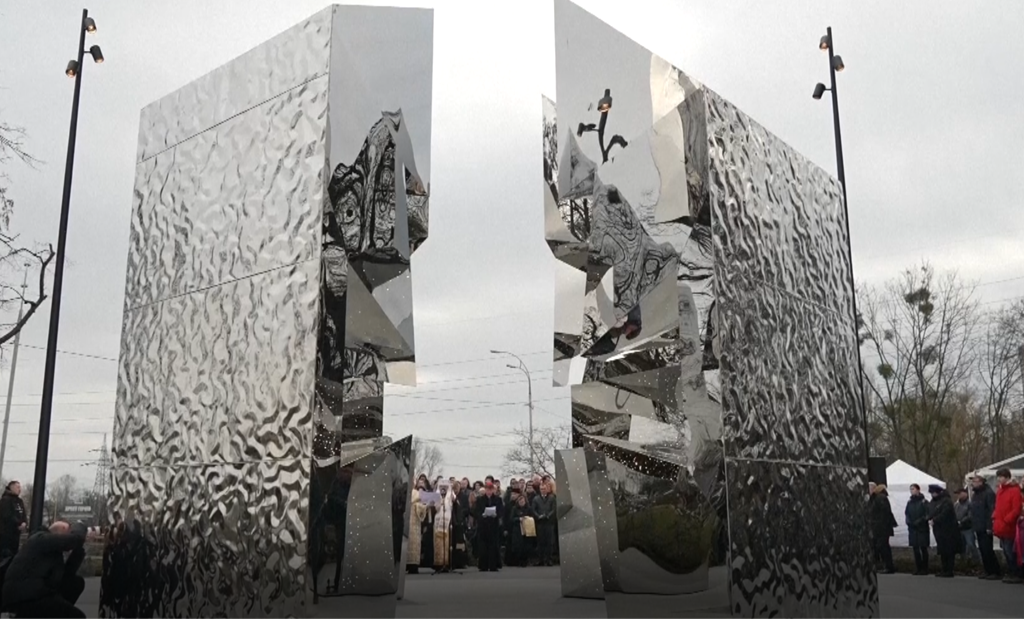 AP
AP
Svyatoslav Shevchuk, head of the Ukrainian Greek Catholic Church, blessed the newly unveiled memorial with holy water.
The glass covered tribute is illuminated with starry lights to represent the soul of lost soldiers, he said.
"Today we came together to create a memory so that Ukraine and the world would remember them," Mr Shevchuk said.
Vyshhorod was chosen as the site of the symbolic monument because Russian helicopters were stopped by Ukrainian forces in the city's hills during the first days of the full-scale invasion.
Ukraine can count on support for 'as long as it takes', says G7
In the past few moments, leaders of the G7 have released a joint statement on the war in Ukraine.
They say Kyiv can count on their support "for as long as it takes" to defeat Vladimir Putin.
"We remain convinced that we can ensure the people of Ukraine prevail in fighting for their future and help to forge a comprehensive, just and durable peace," they say.
"We will continue to support Ukraine's right to self-defence and reiterate our commitment to Ukraine's long-term security."
Part of that support will include helping Ukraine meet its "urgent financing needs" and continuing to degrade Russia's sources of revenue.
"As Ukraine enters the third year of this relentless war, its government and its people can count on the G7's support for as long as it takes," the statement ends. 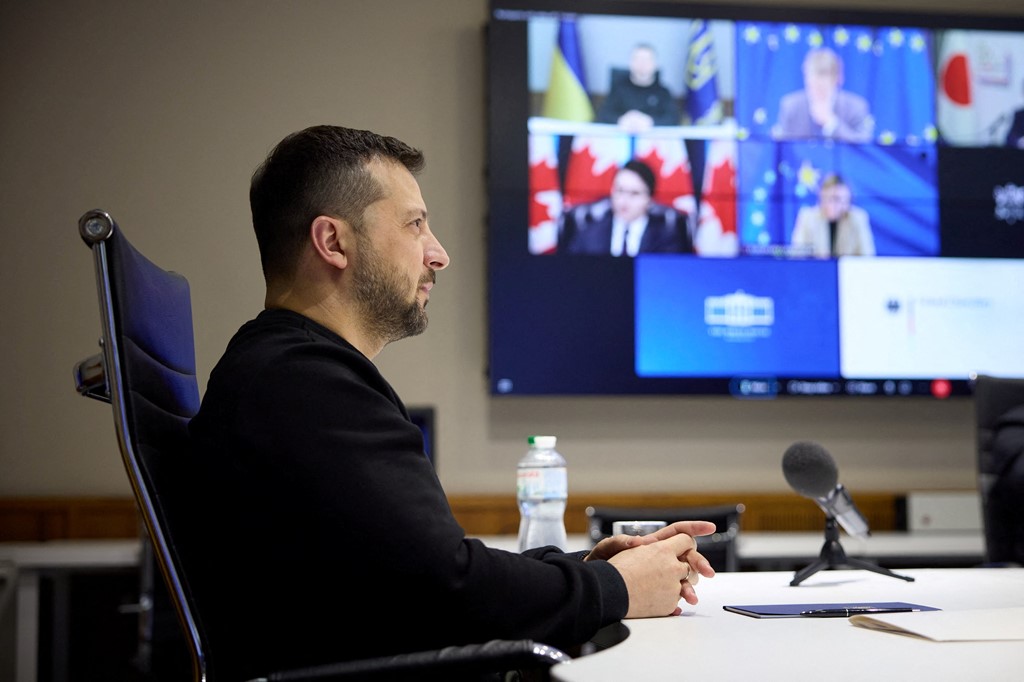 Mr Zelenskyy attends G7 leaders' video conference in December
Mr Zelenskyy attends G7 leaders' video conference in December
Reuters
Call for Russia to 'clarify' Navalny's death
The leaders also pay tribute to Alexei Navalny - a key opponent of Mr Putin who died suddenly in prison more than a week ago - and called for the Russian government to "fully clarify" the circumstances around his death.
"We will hold those culpable for Navalny’s death accountable, including by continuing to impose restrictive measures in response to human rights violations and abuses in Russia and taking other actions," they say.
For context: The G7 is made up of Canada, France, Germany, Italy, Japan, the United Kingdom and the United States.
The European Union has been dubbed the eight member of the group because it holds the privileges and obligations of membership but without the right to host a summit.
They spoke to Mr Zelenskyy earlier today to reaffirm their support for Kyiv on the anniversary of the war.
Russia has lost more than 350,000 soldiers - but it's managed to replace its losses
Russia has lost its entire original invasion force over the course of the war, with more than 350,000 soldiers killed and wounded, the UK's defence ministry has said.
In its latest update, the MoD said Russia deployed around 130 Battalion Tactical Groups for its invasion of Ukraine, which equates to at least 1,300 tanks, 5,000 infantry fighting vehicles and 100,000 men.
Over the space of two years, Russian losses match and, in many cases surpass, those figures, it said.
However, mobilisation, recruitment, production and refurbishment of stockpiles has allowed those losses to be replaced, it added.
This means there are now more Russian forces in Ukraine than at the start of the war, and they are able to maintain attacks on the frontline and "pursue a strategy of attrition", it said.
X
This content is provided by X, which may be using cookies and other technologies. To show you this content, we need your permission to use cookies. You can use the buttons below to amend your preferences to enable X cookies or to allow those cookies just once. You can change your settings at any time via the Privacy Options.
Enable Cookies
'Make love not war': Hundreds march through Serbia's capital
Hundreds of people have gathered for a peaceful march in Serbia's capital to mark the second anniversary of Russia's invasion of Ukraine.
Protesters marched through Belgrade carrying Ukrainian flags and holding banners reading "Make love not war" and "Stop the war in Ukraine".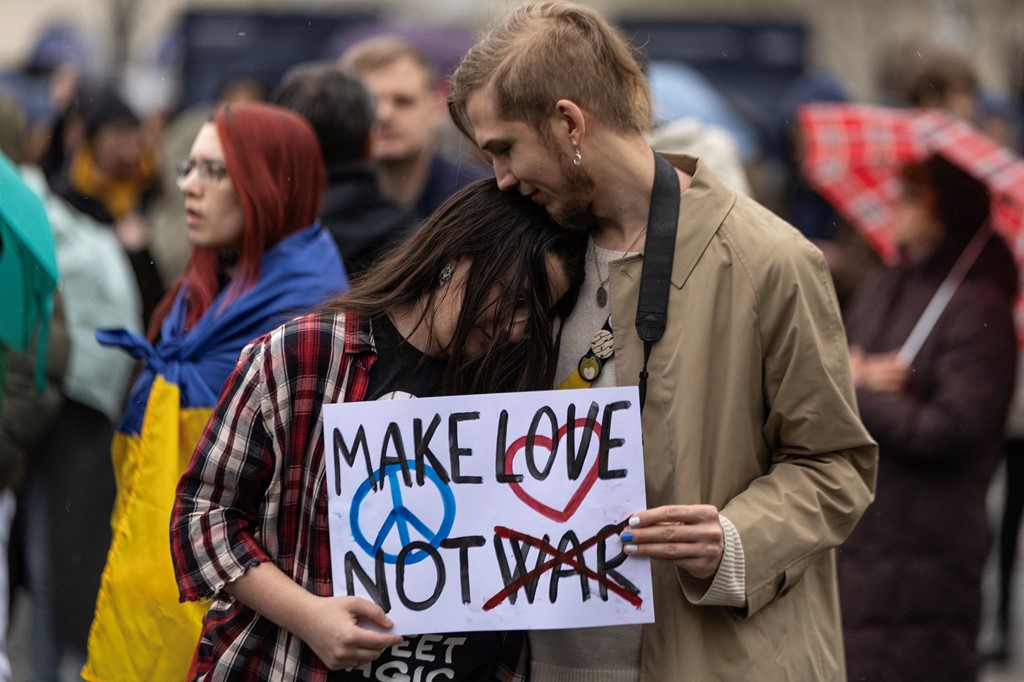 Though it has condemned the invasion of Ukraine, Serbia has not joined Western sanctions against Russia.
Though it has condemned the invasion of Ukraine, Serbia has not joined Western sanctions against Russia.
Instead, it maintains friendly relations with its traditional Slavic ally and pro-Russian sentiments remain high in the country despite the war.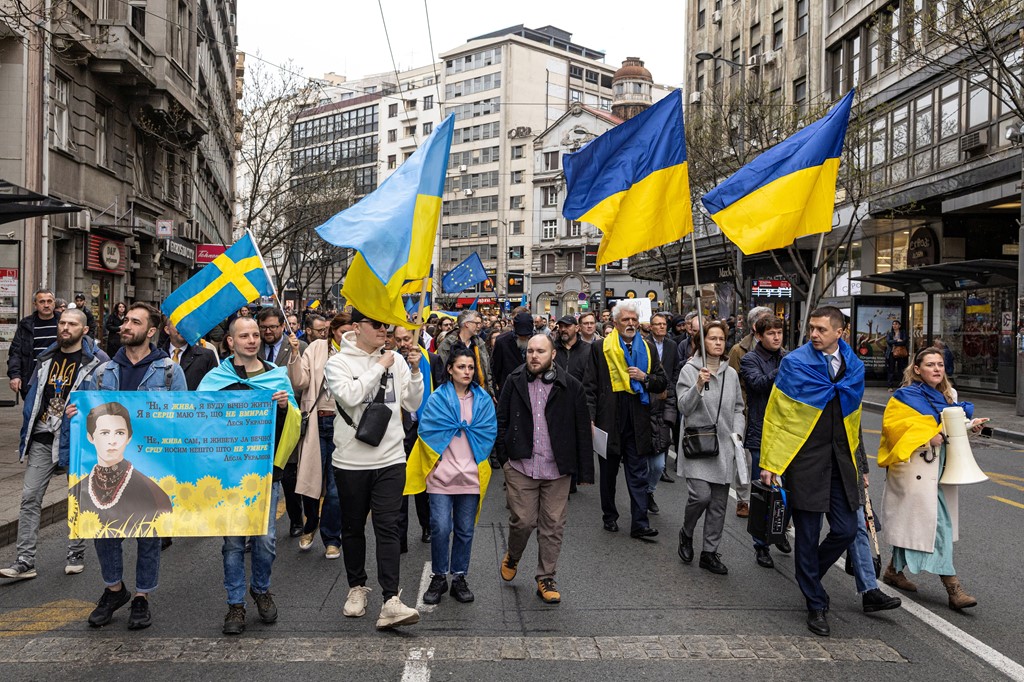 Reuters
Reuters
Ukrainian air force positions 'wiped out' in attack, claims Russia
The Russian defence ministry has claimed to have "wiped out" Ukrainian air force positions in Zaporizhzhia.
Writing on Telegram, the ministry said howitzer crews struck the positions from more than 10km away after the sites were located by reconnaissance teams. 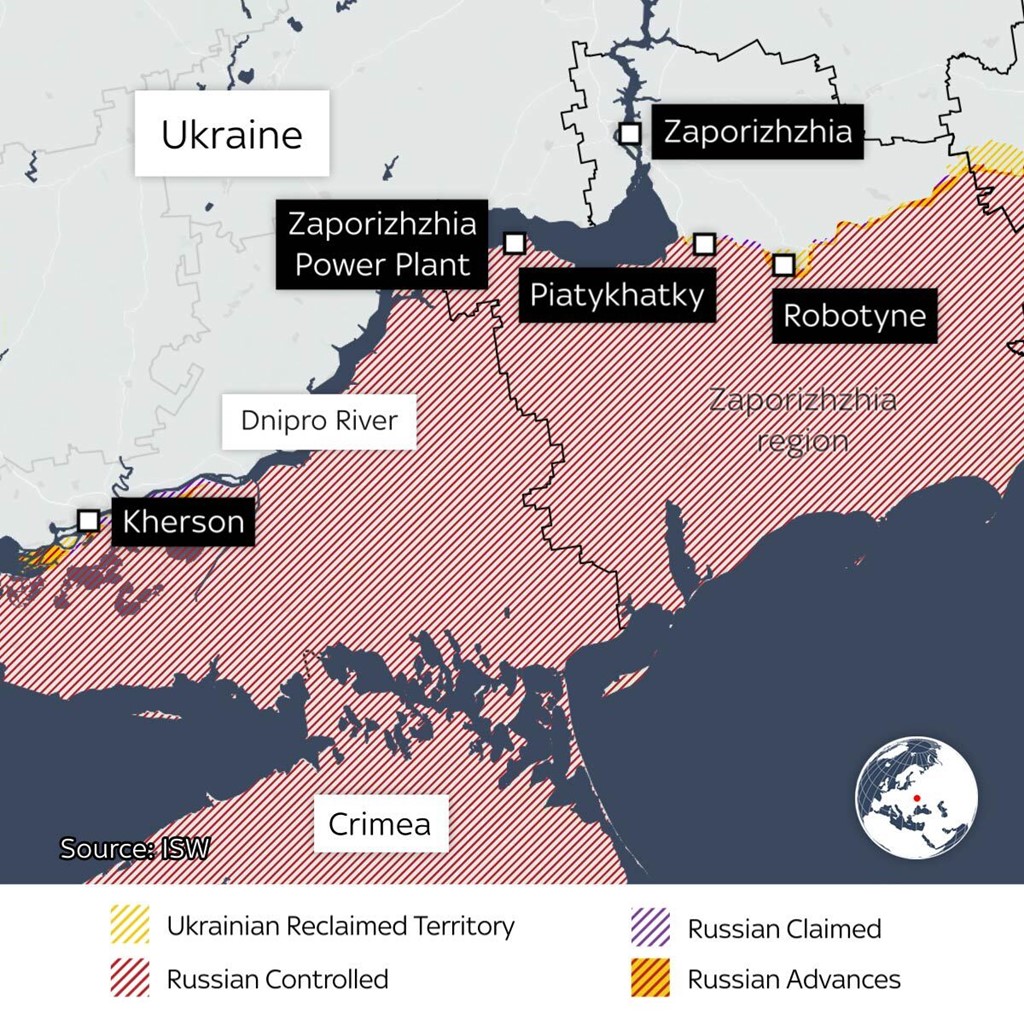 Highly explosive shells which inflicted "maximum damage" were used, it added.
Highly explosive shells which inflicted "maximum damage" were used, it added.
Sky News has not independently verified the claims and Ukraine has not publicly commented on them.
Navalny's body handed over to his mother
The body of Alexei Navalny has been handed over to his mother, his spokesperson Kira Yarmysh has said.
"Alexei's body was given to his mother. Thank you very much to everyone who demanded this with us," she wrote on X.
The best known political opponent of Vladimir Putin died suddenly in prison on 16 February, and Lyudimila Navalnaya has been demanding the authorities hand over his body for days.
Ms Yarmysh added that details of his funeral are yet to come, and it was unclear if authorities will "interfere" with how it is carried out.
"We will provide information as it becomes available," she said.
It comes after Mrs Navalnaya was given an ultimatum yesterday, with Russian authorities saying her son would be buried in the penal colony where he died unless she agreed within three hours to lay him to rest without a public funeral.
Earlier today, Yulia Navalnaya - Mr Navalny's wife - accused the Russian president of mocking Christianity by trying to force his mother to agree to a secret funeral.
Mr Navalny's family and supporters have accused Vladimir Putin of having him killed - an accusation the Kremlin has angrily denied.
He had survived a poisoning attempt in 2020 and years of harsh treatment in prison, including long spells in solitary confinement.






































